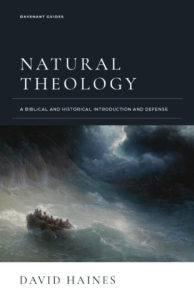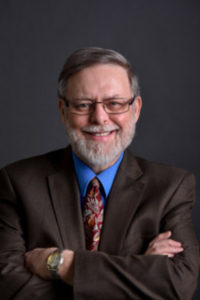
Recovering the Tradition on Natural Theology
T his book is a valuable contribution to theology despite being an incomplete treatment of its topic. It is an important step in the recovery of an important doctrine that has been taught for two thousand years by the best teachers of the church, but which has come under heavy attack in the late modern West. It is true so far as it goes, but like all books it is incomplete. We need more scholarship in this area. Let me give a brief overview, after which I will list what I see as some of the strengths and weaknesses of this book.
his book is a valuable contribution to theology despite being an incomplete treatment of its topic. It is an important step in the recovery of an important doctrine that has been taught for two thousand years by the best teachers of the church, but which has come under heavy attack in the late modern West. It is true so far as it goes, but like all books it is incomplete. We need more scholarship in this area. Let me give a brief overview, after which I will list what I see as some of the strengths and weaknesses of this book.
Overview
The book has three parts. After the introduction there is a chapter on the biblical foundations of natural theology. Haines discusses Psalm 19; Acts 14:16-17; 17:26-27; Romans 1:19-20; 1:32; and 2:14-15. This list is not exhaustive, but it covers the high points well.
The next four chapters give a historical overview of natural theology from the church fathers to post-Reformation reformed theology. There is a chapter on Greek philosophy and the church fathers, which shows an embrace of natural theology from the second century onwards. One notable feature of this chapter is that it shows that even Tertullian – famous for his question “What has Jerusalem to do with Athens?” – taught that the existence of God can be known by reason alone without divine revelation. (84) Another chapter is devoted to Augustine and one to Thomas Aquinas. The last historical chapter covers Reformed theology from Calvin to the late 1700’s including both major theologians and the Reformed confessions.Even Tertullian - famous for his question “What has Jerusalem to do with Athens?” – taught that the existence of God can be known by reason alone without divine revelation. Click To Tweet
A final chapter responds to four objections.
- The first is that natural theology does not reveal the Christian God because it does not reveal the Trinity. But this objection fails to distinguish between knowing that God exists and knowing things about his nature. It is not necessary to have a complete knowledge of the latter in order to know the former. Also, the same objection could be made against the Old Testament, but surely nobody wants to say that the Old Testament God is not the God of the New Testament. Marcion suggested that but the church responded with a forceful no.
- A second objection is that natural theology introduces Greek philosophy into Christian doctrine. But this objection is irrelevant unless it is assumed that the Greek philosophy introduced into Christian theology is false doctrine. But that is denied by the majority tradition. A doctrine of God can be incomplete without being completely false. The doctrine of God in the Torah certainly is not complete by New Testament standards, yet it is not false.
- A third objection is that Greek philosophy is erroneous and incoherent. This is a more plausible objection, and it is partly true. The point that needs to be stressed is that the fathers agree that not all philosophy is true. Augustine’s critical analysis of philosophy is Book VIII of City of God shows this clearly, just to name one example of many.
- The fourth objection is that finding theistic proofs in early church fathers is anachronistic. Oliphint and Edgar make this claim in their book, Christian Apologetics Past and Present. But it does not stand up to historical analysis. As Haines points out, both Plato and Aristotle, as well as various Stoic philosophers such as Cicero had developed proofs for God’s existence prior to the birth of the Church.
A few observations might be in order at this point. The historical overview is of mixed quality. The chapter on Greek philosophy and the church fathers is well-done, considering how much ground it has to cover in a short space. The chapter on Augustine is very good, but the chapter on Thomas is quite brief and omits many important issues. The chapter on reformed theology is heavy on quotations, which is good, but it lacks enough analysis and engagement with the secondary literature to be definitive. To be sure, I think the chapter accurately conveys the reformed position, but it needs more argumentation to convince the skeptical historian.
Overall, this book is focussed on reformed theology and the objections to natural theology from Cornelius Van Til. This is not a criticism, but simply a statement of the book’s limitations. If you are looking for an analysis of why Barth was so opposed to natural theology or what connections there might be between Barth and Van Til, you will need to look elsewhere.
Strengths
This book has been needed for some time. It has a number of valuable strengths that make it well worth reading.The rejection of natural theology goes against the mainstream Christian theological tradition, including the reformed tradition. Click To Tweet
1) First, it has a clear thesis that is both true and important, namely, that the vehement denunciation of natural theology in certain influential strands of twentieth-century Reformed theology is a radical departure from not only classic reformed theology, but also from the mainstream Christian tradition going all the way back to the apostles. It is an interesting historical question to wonder how the followers of Karl Barth and Cornelius Van Till, who were so different from each other in so many ways, both came to reject natural theology in the twentieth century even though reformed theology from 1500-1900 strongly affirmed it. This is a puzzling question, but this book does not really investigate it. Rather, this book has a more modest aim – to show that the rejection of natural theology goes against the mainstream Christian theological tradition, including the reformed tradition.
2) This book proves its thesis conclusively. In order to deepen our understanding of the problem of why these strands of twentieth century reformed theology veered off course, it is necessary first to established the basic fact that it did so. As Haines demonstrates, followers of Van Til like K. Scott Oliphint have claimed that natural theology was “rejected during the Reformation and in seventeenth century Protestant theology.” (9) Haines demonstrates clearly that Oliphint is dead wrong on this point of historical fact. Whether you think natural theology should or should not be rejected, the fact is that the reformed tradition taught natural theology clearly and unambiguously.
3) This book makes some crucial distinctions in defining natural theology that make it possible to speak more precisely about the issue. These distinctions are absolutely necessary if the debate is to take place in a profitable manner.
One issue that constantly gets confused by followers of Van Til is the distinction between saving knowledge of God and non-salvific knowledge of God. But this should be an elementary distinction to keep in mind. Haines quotes Calvin on Rom. 1:19-20 who says that “man does not deduce, by himself, all the things that can be considered in God, but he shows that we come to know his power and eternal divinity.” (Calvin, Romans, as quoted by Haines, 38) Haines then points out that Calvin goes on to state that “although such knowledge should bring us to worship the one true God, due to our blindness it does not.” (38) Calvin stands in the Great Tradition going back to the early church fathers and continuing throughout Protestant orthodoxy in affirming that the fact that sinful humans do know God from observing nature and realizing that it has a First Cause is precisely what makes us guilty before God. How could knowledge that we did not have make us culpable?
This is Paul’s argument in Romans 1, and it is taught all the way through Christian history up to the twentieth century. Haines summarizes what the tradition has generally taken Paul to be teaching in Romans 1:
Paul, then, is not saying that humans are able to attain to a clear and complete understanding of the divine nature. Rather, he seems to be saying that enough can be learned about God from nature that man is responsible for not worshipping God, but not enough is learned about God from nature that man can be saved.” (179)
This summary seems exactly right to me.
Another crucial distinction is between natural theology as partial knowledge of God mixed with error and a complete and accurate knowledge of God. As Haines shows, no serious theologian has ever argued that general revelation provides the latter. It is a recent novelty to make this an all-or-nothing issue in which we either know God perfectly and savingly or we don’t know him at all. This is a false dilemma that only muddies the waters. Peter Martyr Vermigli, for example, speaking of the effects of the fall on our knowledge of God says: “Neither is the unrighteousness which we commit, able to blot it out of our minds.” (quoted by Haines, 153)Natural theology may tell us that God exists, but only special revelation tells us of the Incarnation of the Son and the mission of the Spirit. Click To Tweet
Another crucial distinction is between natural theology and natural religion. Just because the terms sound similar and some theologians have equated them, we must nonetheless distinguish them. The latter is a term used in modern times to describe a religious position that excludes all special revelation and creates an entire theology out of nothing but general revelation. Deism was the outcome of this project in the Enlightenment era, and orthodox theologians have rightly rejected Deism. But natural theology is not incompatible with revealed theology as long as we allow the special revelation in the Bible to supplement and correct natural theology. Natural theology may tell us that the cosmos has a cause, but the Bible reveals that this cause is the One who has spoken through the prophets to Israel. Natural theology may tell us that God is one, but only Scripture reveals that God is Triune. Natural theology may tell us that God exists, but only special revelation tells us of the Incarnation of the Son and the mission of the Spirit.
Another distinction made by Haines is between the argument from the beauty of creation made by Cicero and the argument from design made by contemporary thinkers. The former, he says, is technically an argument from “irreducible complexity” and argues for an intelligent designer. (72) I would like to hear more from the author as to the implications of this distinction. Does perhaps the argument from beauty get us further toward knowledge of God’s nature? Are the two arguments perhaps complementary? Why is the argument for beauty not more common today? This distinction seems important.
4) A fourth strength of this book is that it clearly shows that we ought to believe in natural theology because the Bible teaches it. This shows that in the name of the authority of Scripture basic biblical teaching is being denied by those who reject natural theology. This is both ironic and also a very serious matter. We do not exalt Scripture by denigrating other valid paths to knowledge. Haines shows how wide the consensus on the proper interpretation of biblical texts relating to natural theology has been in the patristic, medieval and Reformation periods.
5) Another strength of this book is that it shows that reformed theologians who reject natural theology are rejecting the teaching of the reformed confessions they profess to believe. Just to mention one quotation, the Canons of Dort say: “[t]here remain, however, in man since the fall, the glimmerings of natural light, whereby he retains some knowledge of God, of natural things, and of the difference between good and evil.” (152) It is one thing for non-creedal Evangelicals to dismiss natural theology but it is considerably more problematic for confessional Protestants to do so.It is one thing for non-creedal Evangelicals to dismiss natural theology but it is considerably more problematic for confessional Protestants to do so. Click To Tweet
Weaknesses
This is not a perfect book. Its weaknesses are not a matter of it being wrong about anything, but merely about it being incomplete in certain ways.
There is no treatment of the change in metaphysics during the Enlightenment, culminating in the works of David Hume and Immanuel Kant, which led to the rejection of natural theology and natural law in late modernity. The fact that Christianity interacted with pagan philosophy during the patristic era shows that broader cultural trends do influence Christian theologians, and this is necessary to take into consideration. How might the Enlightenment have affected reformed theology on this issue of natural theology?
A book mentioned by Haines, entitled The Reformed Objection to Natural Theology by Michael Suddoth, seeks to consider three aspects of the problem: the philosophical objections to natural theology in the Enlightenment, the Barthian rejection of natural theology and the Van Tilian objection. We need to consider not just these three movements, but also how they influenced each other. For example, someone really needs write a detailed treatment of the Kantian and post-Kantian German Idealist background of Van Til’s thought and the strand of Dutch neo-Calvinism that most influenced him (through Dooyeweerd and Vollenhoven). But lest this degenerate into a criticism of the author by the reviewer for not writing the book the reviewer would have written, let it be noted that to expect everything from one book is hardly fair.
I was personally disappointed in the chapter on Thomas, especially since Haines mentions being influenced by Gilson in the introduction. Gilson is especially good on an issue that needs to be explored in this connection, namely, the integration of philosophy into dogmatic theology. We need to get past the question of whether to use philosophy and discuss how philosophy fits into theology and how it should be used as the handmaiden of theology. I suspect that the limitations of space affected the author’s brevity in the treatment of Thomas.
On the level of minor issues, I would mention is that there are too many typos in the book. I counted at least six obvious ones and I was reading quite fast and not looking for them. I also regretted the lack of an author and a scripture index. They would have made the book more useful and been worth the time and money to include.
Conclusion
Finally, I want to end by congratulating Dr. Haines on a very good book and express the hope that perhaps he will have the opportunity to expand this research into a bigger and more detailed work that might even become something of a standard in the field. We should not have to go to the Roman Catholics every time we want a comprehensive, scholarly treatment of this topic.

